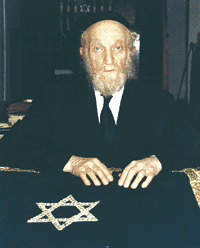By Marvin Greisman
Rabbinical and lay leaders of the Lower East Side community recently commemorated the life of Rabbi Joseph Singer, former rabbi of the Stanton Street Shul, at a memorial service at the Young Israel Synagogue in Manhattan. Rabbi Singer, a devoted activist in serving the poor and frail elderly, died on the eve of Yom Kippur, the holiest day of the Jewish calendar, at age 91. A refugee from Poland, Singer fled the Nazis and Communists and became an important rabbinical figure, stretching out his hand to the poor not only on the Lower East Side, where he served as a rabbi for 58 years, but in communities throughout the city where people asked for his assistance. In addition to serving as the rabbi of the Stanton Street Synagogue for 39 years, he was involved locally in the United Jewish Council and Project Ezra, as well as in serving the neighboring mikvah (ritual bath).
Leading the tribute was Rabbi Yeshaya Siff, the spiritual leader of Young Israel Synagogue of Manhattan, the first such synagogue of the national Young Israel movement. Rabbi Siff, a close associate of Rabbi Singer for 43 years, stated that long before the United Jewish Council of the East Side was formed, the European-born rabbi was out on a mission giving help to those who needed it.
“He went to neighborhoods where people did not go, dealing with people that no one knew, helping those who needed help day and night,” Rabbi Siff said. Siff said that Singer “wrote a golden page of chessed [righteousness], of goodness, concern and devotion to the community.”
Siff noted that Singer made a strong impact on people despite the fact that he spoke broken English, very similar to Moses in the Bible, who had difficulty articulating what he wanted to say.
“He had difficulty speaking with people, and if you would choose someone to deal with people, he would be the last,” Siff observed.
Siff noted that Singer, who was diminutive, never missed an opportunity to roll up his sleeves and pitch in to help the community that he called home. When there was concern that a local butcher was not meeting strict kosher standards, Singer was at the scene to make sure things were going correctly, going down to the basement to inspect it personally. Similarly, he attended faithfully to his regular duties at the mikvah, the oldest such ritual bath in the nation.
Aaron From, the individual most responsible for renovating the mikvah, who worked along Singer to upgrade it to the modern age, said Singer was involved in every facet of the mikvah, carrying out the mandates of Rabbi Moshe Feinstein, who appointed Singer to carry out that mission.
“He was a social worker par excellence,” From added of Singer. “You could take all the master’s in N.Y.U. social work, but it wouldn’t match what Rabbi Singer knew.”
At one point in his career as the rabbi of Stanton Street Shul, Singer confronted Woody Allen, who came to shoot a movie at the Lower East Side synagogue. At the time, Allen made very controversial remarks concerning the Palestinians that did not sit well with the Zionist Jewish community. Singer refused to let Allen’s stand on the Palestinians go away easily and began to argue with the famed Hollywood director and actor. Allen told the elderly rabbi that, forget Judaism, it is a worn-out fossil, echoing remarks by British philosopher Arnold Toynbee. But the rabbi, irritated with Allen’s assessment of Judaism, shot back, telling him bluntly that the Torah was eternal and without it, there would be no world and that the Torah will be everlasting.
Misha G. Avramoff, executive director of Project Ezra, who continues to provide leadership in serving the Jewish elderly on the Lower East Side, traced his long relationship with the deceased rabbi, who he helped in starting a soup kitchen at the Stanton Street Shul to feed the hungry. Avramoff, a secular Jew, was easily able to bridge the gap with the Orthodox Hasidic rabbi.
“Rabbi Singer,” Avramoff said, “was this incredible human being who was able to reach out, and for those of us who sometimes struggle with God, he understood us and he said, ‘The work of your hands will do everything that you have to do.’”
The late Village Voice writer Paul Cowan credited Singer with bringing him back to his Jewish roots.
In his book, “An Orphan in History,” Cowan wrote, “For like most transmitters of faith, Rabbi Singer’s power resides in his personality that has withstood the lures of twentieth-century rationalism, and therefore preserved what is most compelling about traditional Judaism.”

































